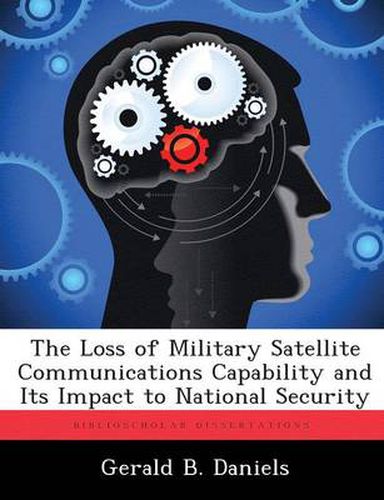Readings Newsletter
Become a Readings Member to make your shopping experience even easier.
Sign in or sign up for free!
You’re not far away from qualifying for FREE standard shipping within Australia
You’ve qualified for FREE standard shipping within Australia
The cart is loading…






This title is printed to order. This book may have been self-published. If so, we cannot guarantee the quality of the content. In the main most books will have gone through the editing process however some may not. We therefore suggest that you be aware of this before ordering this book. If in doubt check either the author or publisher’s details as we are unable to accept any returns unless they are faulty. Please contact us if you have any questions.
Our military has become more dependent on satellite communications than ever before in history. The ability to communicate is fundamental to military operations - providing information to the field commander, the ability to command and control forces, and the ability to send targeting information to combat units. Military satellite communications are critical to meet these warfighter requirements for assured and survivable communications on-demand, on-the-move, and around the globe. The Department of Defense (DoD) calculates the demand for satellite communications to grow over the next decade and beyond. The type of asymmetric advantage we once enjoyed is quickly eroding as space products become widely available to our adversaries. Our ability to command the commons (to include space) may be fleeting as other countries continue to develop and launch their own resources and potential threats to ours. We may no longer maintain the ultimate high ground. Why is the US military is growing more and more dependent upon satellite communications? As technology and information continues to develop to help reduce the fog of war to the deployed commander, the more he becomes dependent on those resources especially on today’s asymmetric battlefield. Military commanders need timely reliable access to a substantial amount of intelligence, surveillance, and reconnaissance information on the battlefield. The Defense Satellite Communications System (DSCS) provides the bandwidth necessary to transmit such volumes of data. Military planners should take into account the potential for any opponent to exploit these satellite-based services. The more we become reliant on space communications assets, the more vulnerable we become if access is denied. As our reliance on satellite communications becomes the panacea for all deployment contingency plans, the loss thereof may severely hinder our capability or completely cripple our operations
$9.00 standard shipping within Australia
FREE standard shipping within Australia for orders over $100.00
Express & International shipping calculated at checkout
This title is printed to order. This book may have been self-published. If so, we cannot guarantee the quality of the content. In the main most books will have gone through the editing process however some may not. We therefore suggest that you be aware of this before ordering this book. If in doubt check either the author or publisher’s details as we are unable to accept any returns unless they are faulty. Please contact us if you have any questions.
Our military has become more dependent on satellite communications than ever before in history. The ability to communicate is fundamental to military operations - providing information to the field commander, the ability to command and control forces, and the ability to send targeting information to combat units. Military satellite communications are critical to meet these warfighter requirements for assured and survivable communications on-demand, on-the-move, and around the globe. The Department of Defense (DoD) calculates the demand for satellite communications to grow over the next decade and beyond. The type of asymmetric advantage we once enjoyed is quickly eroding as space products become widely available to our adversaries. Our ability to command the commons (to include space) may be fleeting as other countries continue to develop and launch their own resources and potential threats to ours. We may no longer maintain the ultimate high ground. Why is the US military is growing more and more dependent upon satellite communications? As technology and information continues to develop to help reduce the fog of war to the deployed commander, the more he becomes dependent on those resources especially on today’s asymmetric battlefield. Military commanders need timely reliable access to a substantial amount of intelligence, surveillance, and reconnaissance information on the battlefield. The Defense Satellite Communications System (DSCS) provides the bandwidth necessary to transmit such volumes of data. Military planners should take into account the potential for any opponent to exploit these satellite-based services. The more we become reliant on space communications assets, the more vulnerable we become if access is denied. As our reliance on satellite communications becomes the panacea for all deployment contingency plans, the loss thereof may severely hinder our capability or completely cripple our operations